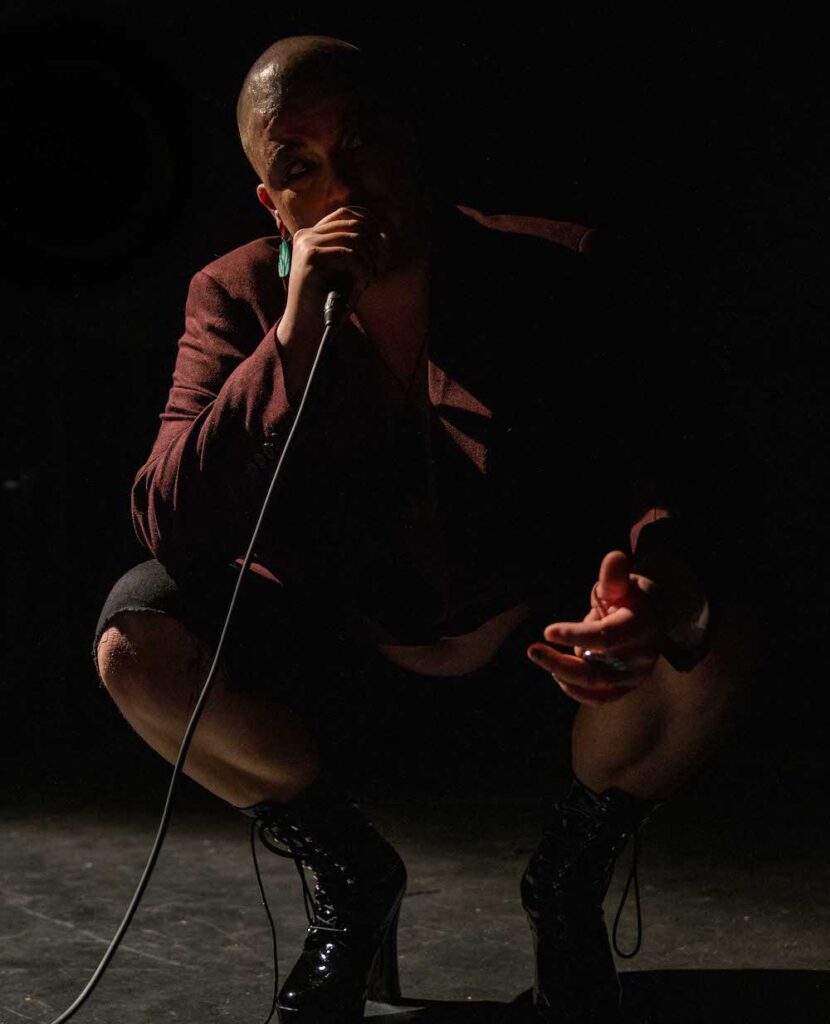In a show built around vocal performance, Daley Rangi produces a well-honed and stylish performance, writes Jonathan W. Marshall.
Probing the darkness of patriarchal violence
5 February 2022
- Reading time • 5 minutesTheatre
More like this
- Just what the doctor ordered
- Lifting the weight of the world
- Gentle touch guides lunar landing
Takatāpui, Daley Rangi ·
The Blue Room Theatre, 4 February 2022 ·
In 2020 we saw local multi-disciplinary artist Daley Rangi (as Daley King) in Lipstuck but they take a decidedly darker turn in their one-person show Takatāpui.
Rangi devised Takatāpui in 2020 with Adelaide’s Vitalstatistix theatre company, and the script has had a small publication run. It is now having its Perth premiere as part of the Blue Room Summer Nights series.
Although further development might help, Takatāpui is a strong work held together by Rangi’s powerful yet vulnerable presence.
As a performative spoken word piece, Takatāpui builds on traditions set by Spalding Grey (who in Swimming to Cambodia, 1987, also performed at a desk with a microphone), Laurie Anderson (who also mixes poetic musings with vocal distortion), and perhaps most closely Karen Finley (especially her autobiographical confessions of sexuality and trauma).
Takatāpui relates an especially horrific night out which starts with homophobic abuse on the train and concludes with a terrifying escape from date rape. The journey isn’t entirely linear, with narrative sections interspersed with angry commentary or deeply intoned, emotionally divided poetry.

Rangi uses a pedal fed into a simple sound processing unit to drop their vocal tone, to autotune their voice in the style of Kanye West, or to create short loops. These combinations are often sonically and dramaturgically arresting, in particular when Rangi samples a homophobic taunt and uses it as chorus and accompaniment.
Rangi’s pitch-dropped, bass self emerges as a key character: a double to our protagonist who speaks back to them to offer advice, criticism and comment.
I was personally less taken by the autotuning, which is somewhat overused and which quite literally makes all text sound harmonically flat or horizontal. This has an interesting emotionally empty feel, but blunts the dramaturgical ups and downs. Nevertheless, Rangi’s autotune version of the song “Bad Moon Rising” is a highlight.
Although focused on vocal performance, Rangi’s journey is punctuated by an increasingly forced set of lip sync performances.
At various points, club lights come on, a disco classic booms out, and as Rangi gets up to admonish the sound operator, the performer is forced by their own embodiment to move their mouth, arms, legs and groin.
These performances stumble and stutter, as Rangi at once lets loose, but is simultaneously enslaved. The scenes serve as compelling metaphors for social interaction, especially for a queer Māori person such as Rangi, where habits and possibilities are both opened up and curtailed; socially controlled and yet ecstatically embraced.
Takatāpui ends on an ambivalent note, not quite victorious in Rangi’s successful escape from their attacker, yet not upbeat. This fits the tone of the piece well, but it feels somewhat unresolved, as though a further denouement or poetic enfolding was called for.
Irrespective, Takatāpui is a well-honed DIY-type studio performance, simple and stylish in execution, as it probes the darkness of racially and sexually marked social interactions.
Takatāpui continues until 12 February 2022
Pictured top: Daley Rangi in the one-person performance ‘Takatapui’. Photo: Sophie Minissale
Like what you're reading? Support Seesaw.






